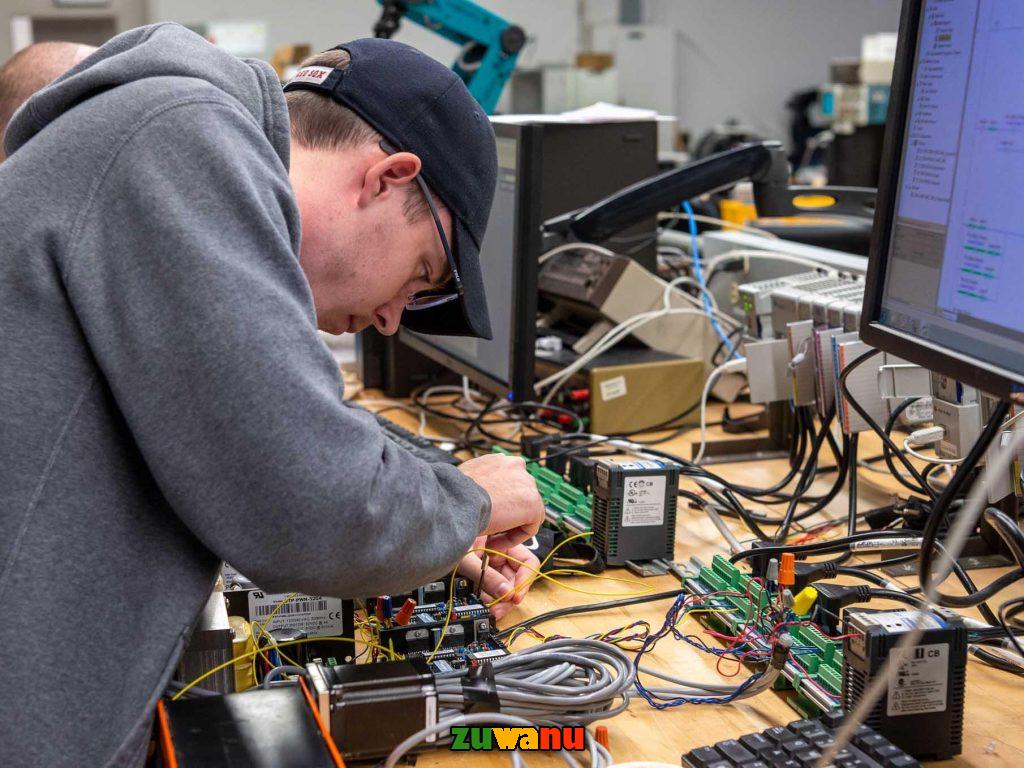Computer Engineering

In the modern age of technology, computer engineering stands as a pivotal discipline that fuels innovation and drives the evolution of our digital world. From crafting complex systems to developing cutting-edge software, computer engineers play a vital role in shaping the technological landscape. This article delves into the multifaceted realm of computer engineering, discussing its career prospects, involvement in robotics, educational merits, comparison with software engineering, its perceived difficulty, and distinctions from information technology.
Understanding Computer Engineering
Computer engineering is an interdisciplinary field that combines principles of electrical engineering and computer science to design, develop, and optimize computing systems. It bridges the gap between hardware and software, incorporating hardware design, software development, and the integration of both components into efficient and functional systems. Computer engineers are equipped with the knowledge to work on a diverse range of projects, from microprocessors and circuit design to network architecture and embedded systems.
Career Opportunities in Computer Engineering
The skill set of a computer engineer opens doors to a wide array of career opportunities across industries. Some of the notable sectors where computer engineers can find employment include:
- Technology Companies: Computer engineers are highly sought after by tech giants like Apple, Google, Microsoft, and Intel, where they contribute to designing and developing innovative products and services.
- Embedded Systems: These engineers work on creating systems that are embedded within other devices, such as medical devices, automotive control systems, and IoT devices.
- Telecommunications: Computer engineers are essential for designing and maintaining the intricate network systems that underpin modern communication networks.
- Robotics: Yes, computer engineers do play a role in robotics. They are involved in developing the hardware and software that power robots, enabling them to perform various tasks autonomously.
- Aerospace and Defense: Computer engineers contribute to the design and development of avionics systems, flight control systems, and other critical components in the aerospace and defense sectors.
- Healthcare: From medical imaging systems to healthcare informatics, computer engineers contribute to advancing medical technology.
- Gaming Industry: The gaming industry thrives on sophisticated graphics, AI algorithms, and immersive user experiences—all areas where computer engineers excel.
- Financial Services: Computer engineers work on high-frequency trading systems, security protocols, and financial software used in banking and finance.
- Academia and Research: Many computer engineers pursue careers in academia and research, contributing to technological advancements and education.
Computer Engineers and Robotics
The association between computer engineers and robotics is undeniably strong. Robotics involves the integration of various engineering disciplines, including mechanical, electrical, and computer engineering. Computer engineers play a pivotal role in robotics by:
- Hardware Design: They design and implement the hardware components that make up robots, including sensors, actuators, and microcontrollers.
- Software Development: Computer engineers develop the software that enables robots to perceive their environment, make decisions, and carry out tasks autonomously.
- Control Systems: They design control systems that regulate the movements and actions of robots, ensuring precision and accuracy.
- AI and Machine Learning: Computer engineers leverage AI and machine learning techniques to enhance robots’ ability to adapt, learn, and improve their performance over time.
- Human-Robot Interaction: Computer engineers contribute to developing interfaces that facilitate seamless communication and interaction between humans and robots.
Robots have found applications in various industries, from manufacturing and healthcare to exploration and entertainment. As technology continues to advance, the role of computer engineers in robotics is only expected to grow.
Is Computer Engineering a Good Course?
Pursuing a degree in computer engineering can be a rewarding choice, but it’s essential to weigh the pros and cons before making a decision. Here are some reasons why computer engineering can be a good course:
- Job Demand: The digital era demands skilled computer engineers, leading to a high demand for professionals in this field across industries.
- Diverse Opportunities: Computer engineering offers a diverse range of career paths, allowing graduates to explore various sectors and roles.
- Innovation: Computer engineers drive technological innovation by creating novel solutions to complex problems.
- Financial Reward: The technical expertise of computer engineers is often well-compensated due to their critical role in driving technological advancements.
- Constant Learning: Technology is ever-evolving, ensuring that computer engineers are always learning and adapting to new challenges.
However, it’s important to note that computer engineering can be demanding. The coursework can be rigorous, and staying updated with rapidly changing technologies is necessary to remain competitive in the job market.
Computer Engineering vs. Software Engineering
Computer engineering and software engineering are closely related disciplines, yet they have distinct focuses and skill sets.
Computer Engineering:
Computer engineering encompasses both hardware and software aspects of computing systems. Computer engineers design and develop the physical components of computers, including microprocessors, memory systems, and communication interfaces. They are also skilled in programming and software development, but their expertise extends beyond software to the integration of hardware and software components.
Software Engineering:
Software engineering, on the other hand, primarily revolves around the design, development, testing, and maintenance of software applications. Software engineers focus on creating efficient, reliable, and user-friendly software solutions. While they need to understand hardware basics, their primary expertise lies in writing code, designing algorithms, and ensuring software quality.
In essence, computer engineers are equipped to work at both the hardware and software levels, while software engineers concentrate exclusively on software development.
Is Computer Engineering Hard?

The perceived difficulty of computer engineering, like any field, can vary depending on individual aptitude, dedication, and prior experience. Computer engineering does involve complex concepts, intricate problem-solving, and a continuous need to adapt to evolving technologies. Students can expect to study subjects like digital logic design, computer architecture, programming languages, and electrical circuits.
The difficulty can also be subjective. If you’re passionate about technology and have a natural curiosity for how computers work, you might find the challenges more engaging than overwhelming. The rigor of the coursework and the time required for hands-on projects are aspects that contribute to the perception of difficulty.
Computer Engineering vs. Information Technology
Computer engineering and information technology (IT) are often confused due to their overlapping domains, but they are distinct fields with differing focuses.
Computer Engineering:
As discussed earlier, computer engineering encompasses both hardware and software aspects, emphasizing the design and development of computing systems, microprocessors, embedded systems, and more. It integrates electrical engineering principles with computer science.
Information Technology:
Information technology is concerned with the management and application of computer systems, networks, and software within an organizational context. IT professionals manage IT infrastructure, ensure network security, provide technical support, and maintain software systems. While IT professionals may have programming skills, their primary role is to manage and optimize existing technology systems.
In summary, computer engineering is more about creating technology, while information technology revolves around using and managing technology for business operations.
Conclusion
Computer engineering is a dynamic and multidisciplinary field that shapes the technological landscape we inhabit. From designing intricate hardware components to developing complex software solutions, computer engineers contribute to virtually every industry. The integration of hardware and software expertise, coupled with the potential for innovation, makes computer engineering an exciting career path.
Whether working on cutting-edge robotics projects, developing revolutionary software applications, or crafting efficient computing systems, computer engineers are at the forefront of technological advancement. While the challenges can be
substantial, the rewards in terms of career opportunities, financial compensation, and the satisfaction of contributing to innovation make computer engineering a compelling choice for those passionate about technology. As the digital world continues to evolve, computer engineering will remain a cornerstone of progress, shaping the future in ways we can only begin to imagine.
